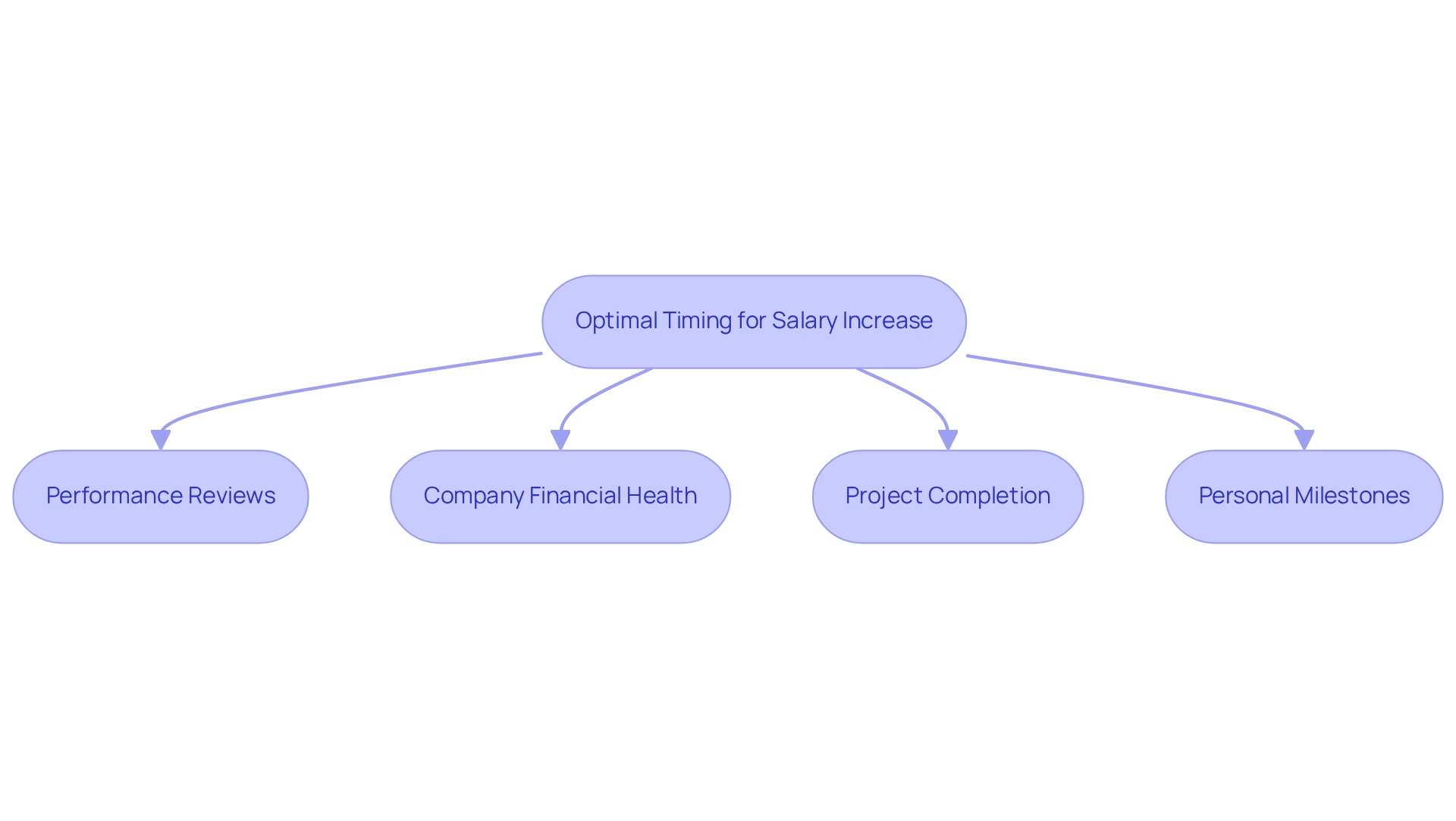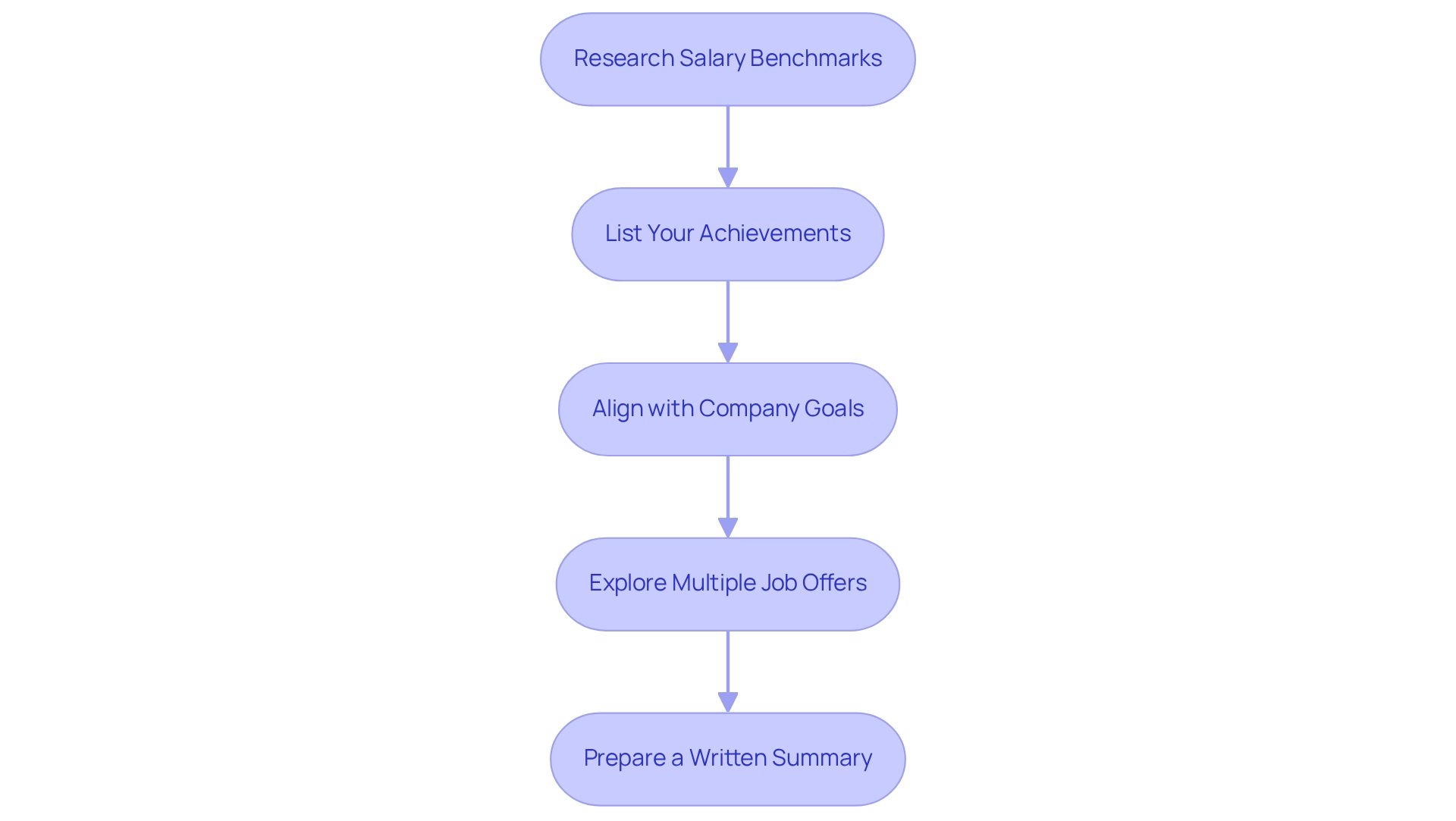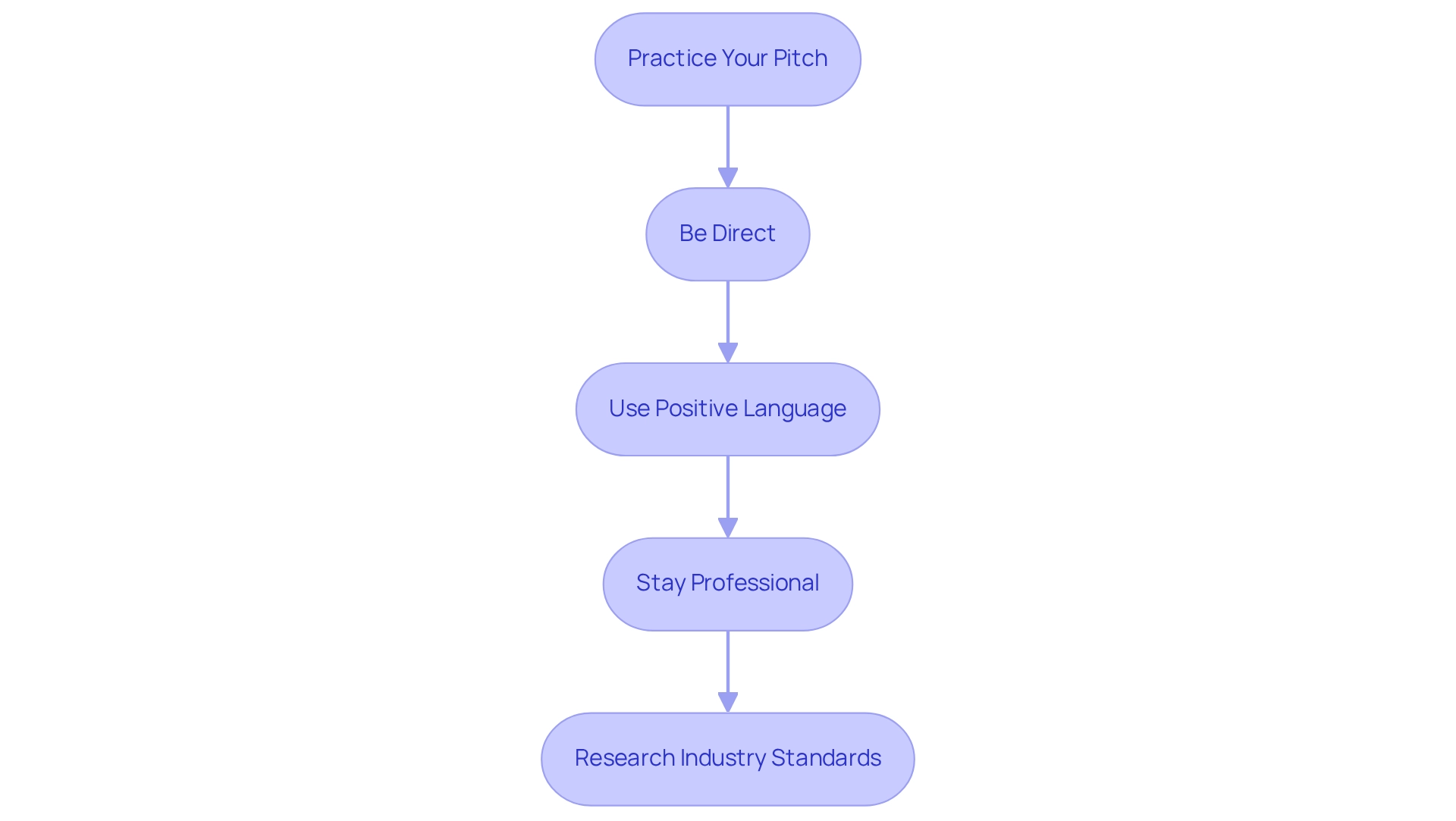Overview
To effectively request a salary increase, it is essential to:
- Strategically select the timing of your approach.
- Prepare a compelling case supported by relevant data and accomplishments.
- Articulate your request with clarity and confidence.
Aligning your contributions with company goals is crucial; this not only demonstrates your value but also resonates with management’s objectives.
Practicing your pitch and preparing to address potential objections can significantly bolster your chances of a successful negotiation. By approaching this conversation with a well-prepared strategy, you position yourself as a knowledgeable and confident candidate, thereby increasing the likelihood of a favorable outcome.
Key Highlights:
- Optimal timing for a salary increase request includes after performance reviews, during company growth, after project completions, or following personal milestones.
- Research salary benchmarks to understand your market value and prepare data on your accomplishments to support your request.
- Align your contributions with company goals to strengthen your case for a salary increase.
- Practice articulating your request confidently and clearly, using positive language and maintaining professionalism.
- Listen actively and acknowledge your manager’s concerns during salary discussions to foster constructive dialogue.
- Be prepared to provide counterarguments with data if objections arise, and seek feedback if your request is denied to improve future negotiations.
Introduction
Navigating the intricate landscape of salary negotiations requires more than merely requesting a raise; it necessitates a strategic approach that can significantly elevate the chances of success. From identifying the optimal timing to articulating one’s value with precision, each step is pivotal in the process. As employees increasingly perceive themselves as undervalued, it becomes essential to understand how to prepare effectively and present a compelling case for a salary increase. This article explores the key strategies that empower individuals to advocate confidently for their worth, equipping them to address objections and negotiate adeptly in today’s competitive job market.
Choose the Right Time to Ask for a Salary Increase
To effectively approach asking for a salary increase, identifying the optimal timing is crucial. Consider the following strategies:
- Performance Reviews: Timing your request shortly after a positive performance review can be advantageous, as your contributions will be fresh in your manager’s mind. This is a prime opportunity to highlight your achievements and discuss your value to the team. As Eric Eddy noted, the firm’s ability to deliver top-notch candidates quickly and efficiently reflects the importance of showcasing performance at the right moment.
- Company Financial Health: Understanding your company’s financial situation is essential. If the organization is experiencing growth or profitability, it presents a favorable context for salary discussions.
- Project Completion: Successfully completing a significant project can serve as a strong foundation for your appeal. Use this achievement to demonstrate your impact and the value you bring to the organization. Boutique Recruiting’s impressive track record of success illustrates how strategic timing can lead to effective outcomes in negotiations.
- Personal Milestones: Reflect on your own professional milestones, such as obtaining a major certification or taking on additional responsibilities. These achievements can strengthen your argument for asking for a salary increase, and by strategically choosing the appropriate moments for your appeal, you improve the chances of a positive result. Notably, statistics indicate that 60 percent of full-time employees feel undervalued at work, underscoring the importance of advocating for your worth. Additionally, if an employer initially denies your request, consider using the feedback to improve and establish a timeline to revisit the discussion, ensuring you remain proactive in your pursuit of fair compensation.

Prepare Your Case with Salary Data and Accomplishments
Preparation is crucial for effectively asking for a salary increase, and it begins with gathering relevant data and documenting your accomplishments.
- Research Salary Benchmarks: Utilize Boutique Recruiting’s comprehensive Salary Guides to determine the average salary range for HR managers in 2025, which typically falls between $140,000 and $200,000, depending on industry and location. These guides provide valuable insights into competitive compensation across key California markets, ensuring you have the most accurate data at your fingertips.
- List Your Achievements: Compile a comprehensive list of your contributions, highlighting successful projects, revenue generated, and any awards received. Quantifying your achievements is essential; for example, stating, “Increased sales by 20% over the last quarter” provides concrete evidence of your impact.
- Align with Company Goals: Illustrate how your work supports the company’s objectives. If you have implemented strategies that enhance efficiency, detail how these improvements contribute to the organization’s overall success. This alignment not only strengthens your case but also demonstrates your commitment to the company’s mission.
- Explore Multiple Job Offers: Consider all available options before making a decision. Exploring various job offers can reveal opportunities that better align with your long-term career goals and aspirations.
- Prepare a Written Summary: Create a concise document that encapsulates your research and accomplishments. This summary will serve as a useful reference during your discussion, ensuring you express your worth effectively.
Effective preparation not only boosts your confidence but also enhances your outcomes when asking for a salary increase. A well-informed decision takes time, but when the right choice is made, the feeling is incredible.

Articulate Your Request Clearly and Confidently
When it’s time to make your request, follow these steps:
- Practice Your Pitch: Rehearse your message to ensure you sound confident and well-prepared. This preparation is akin to applying for a new job, optimizing your chances of success. Remember, just as candidates explore multiple job offers, you should be ready to articulate your value clearly.
- Be Direct: Initiate the conversation by clearly stating your need. For example, express, “I would like to discuss asking for a salary increase based on my contributions to the team.” This directness mirrors the approach candidates should take when evaluating job offers.
- Use Positive Language: Frame your appeal in a constructive manner. Instead of stating, ‘I deserve a raise,’ think about expressing, ‘I believe my contributions justify a review of my current compensation.’ This positive framing can help create a more collaborative atmosphere, similar to how candidates should approach potential employers.
- Stay Professional: Maintain professionalism throughout the discussion, regardless of the response. This approach not only reflects well on you but also sets a respectful tone for the conversation, akin to how candidates should conduct themselves during interviews.
Articulating your request while asking for a salary increase with clarity and confidence is crucial. Research indicates that most workers should anticipate a raise every 1-2 years, particularly in the financial sector where compensation can be closely tied to performance metrics. Therefore, it’s essential to compare your compensation with industry standards and peers to assess if you are underpaid. Grasping the subtleties of the financial sector, as emphasized in the context of evaluating job offers, can offer important perspectives on market expectations and compensation standards. By employing these strategies, you can effectively communicate your value and enhance your chances of a favorable outcome.

Handle Objections and Responses Gracefully
When confronted with objections during compensation discussions, employing effective strategies can significantly enhance outcomes. Consider these key approaches:
- Listen Actively: Demonstrating respect and understanding is essential. Pay close attention to your manager’s concerns without interruption, fostering a constructive dialogue. Statistics show that effective communicators often achieve better results in salary discussions, underscoring the critical nature of active listening.
- Acknowledge Their Points: Validating your manager’s concerns helps build rapport. For instance, you might say, “I understand that budget constraints are a concern,” which illustrates your recognition of their perspective.
- Provide Counterarguments: Equip yourself with data to effectively counter objections. If budget issues arise, emphasize how your contributions have positively impacted revenue or operational efficiency, reinforcing your value to the organization.
- Stay Open to Discussion: If your request is initially denied, seek constructive feedback on how to position yourself for a future increase. This demonstrates your commitment to personal and professional growth.
Dr. Jim Hennig aptly states, “Negotiation is like an athletic contest; Momentum is paramount!” This highlights the importance of maintaining momentum during negotiations.
Handling objections with grace can transform a challenging conversation into a stepping stone for future negotiations. Moreover, case studies indicate that individuals in developed nations are more proactive in negotiating compensation, influenced by economic stability and cultural norms. This emphasizes the importance of understanding the audience and adapting your approach accordingly. By applying these strategies, you can navigate objections more effectively and enhance your chances of asking for a salary increase. Remember, job seekers should always be prepared to negotiate to secure better pay and benefits.
Conclusion
Navigating salary negotiations effectively requires a strategic approach that encompasses timing, preparation, clear communication, and the ability to handle objections. Have you identified the right moment to ask for a raise? Timing can significantly increase the likelihood of a favorable outcome, especially after a positive performance review or upon completing a significant project. Understanding the financial health of the organization and leveraging personal accomplishments further bolster your case for a salary increase.
Preparation is equally vital. Researching salary benchmarks, documenting achievements, and aligning contributions with company goals equip you with the necessary tools to advocate for your worth confidently. Articulating your request with clarity and professionalism sets the stage for a constructive conversation, reinforcing the importance of positive language and directness.
Moreover, gracefully handling objections can transform potential setbacks into opportunities for growth. Active listening, acknowledging concerns, and providing well-researched counterarguments foster a collaborative atmosphere that benefits both parties. By applying these strategies, you not only enhance your chances of securing a salary increase but also develop essential negotiation skills that will serve you throughout your career.
Ultimately, advocating for fair compensation is a critical aspect of professional growth. By employing these techniques, you can confidently navigate the complexities of salary negotiations and ensure that your contributions are recognized and rewarded in today’s competitive job market. Are you ready to take the next step in your career?
Frequently Asked Questions
What is the importance of timing when asking for a salary increase?
Timing is crucial when asking for a salary increase, as it can significantly influence the outcome of your request. Choosing the right moment can help highlight your contributions and improve your chances of a positive response.
When is a good time to ask for a salary increase?
Good times to ask for a salary increase include shortly after a positive performance review, when the company is experiencing growth or profitability, after successfully completing a significant project, or following personal professional milestones such as obtaining a major certification or taking on additional responsibilities.
How can a performance review impact my salary increase request?
Timing your request shortly after a positive performance review can be advantageous because your contributions will be fresh in your manager’s mind, allowing you to effectively highlight your achievements and discuss your value to the team.
Why is it important to understand my company’s financial health before asking for a raise?
Understanding your company’s financial situation is essential because if the organization is experiencing growth or profitability, it creates a favorable context for salary discussions, increasing the likelihood of a successful request.
How can completing a significant project help my case for a salary increase?
Successfully completing a significant project can serve as a strong foundation for your appeal, demonstrating your impact and the value you bring to the organization, thus strengthening your argument for a salary increase.
What personal milestones should I consider when asking for a salary increase?
Personal milestones such as obtaining major certifications or taking on additional responsibilities can strengthen your case for a salary increase. Highlighting these achievements can improve your chances of a positive result.
What should I do if my initial request for a salary increase is denied?
If your request is initially denied, consider using the feedback provided to improve your performance and establish a timeline to revisit the discussion, ensuring you remain proactive in pursuing fair compensation.
